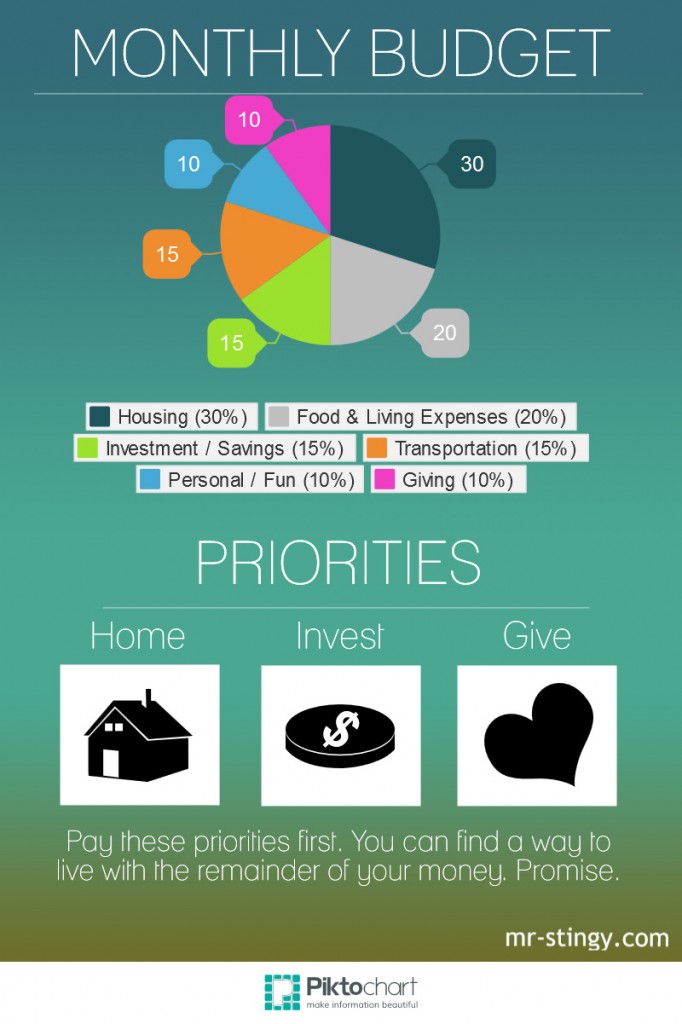At the end of every month, do you find yourself nervously checking the calendar while periodically logging on to your online banking account?
I do (sometimes).
For the average wage-earner, salary day is the monthly beacon of hope in the never-ending struggle of modern day living. But look long term, and disturbing questions arise: “Will I ever own a nice home?” “Will I ever be rich?” “Will I have enough for retirement?”
In this article we’ll look at how budgeting can help you manage your finances better.
Why Budget?
The painfully simple rule of accumulating money is – spend less than you earn and invest the rest. The question is: how much should I be spending each month – on my home, my car and my overpriced mocha lattes? Here’s where a good budget comes in. A fixed percentage of your salary to use for each of your needs and wants so you can control your finances.
A percentage based budget is scalable. Meaning you can use it whether you earn RM 3,000 a month or RM 30,000. You’ll just need to tweak it to adapt to your needs. If you earn less, you need to spend more on meeting essential needs like housing and transportation – so you’ll save and invest less. If you earn more, you can tweak the percentages to save and invest more. That’s how to slowly, but eventually become rich.
The Recommended Budget
Here’s my general recommendation on how you should divide your income every month (after tax and EPF).
|
Category |
Percentage of Take Home Salary |
|
Housing (Home Loan / Rent) |
30% |
|
Giving |
10% |
|
Investment / Savings |
15% |
|
Food & Living Expenses |
20% |
|
Transportation |
15% |
| Personal / Fun |
10% |
Home – 30%
If you’re like most people, this is where the bulk of your money is spent. The current housing situation has it that it’s still cheaper to buy than to rent in Malaysia. If you’re not sure, try out these handy calculation tools:
http://www.hsbc.com.my/1/2/personal-banking/home-loans/calculators-and-tools/rent-vs-buy-calculator
http://www.nytimes.com/interactive/business/buy-rent-calculator.html?_r=0
(And yes, despite what your parents tell you – sometimes it is cheaper to rent than buy)
So if you’re still renting – look to start buying a home. Or at least, start saving a lot of money towards it.
Current home prices are sky-high right now so you’ll likely be spending more than 30% here. Look to cut down costs everywhere else – especially on transportation.
Giving – 10%
10% is a lot, I know. But here’s why I recommend giving away at least 10% of your net salary:
Because it reminds you that there are a lot of people less fortunate than you out there. And it teaches you that no matter how much or how little you earn, you can afford to give that 10% away. We’re all connected in society and need to help each other. It also helps you to practice generosity and gratitude.
Besides, using your money to help others is scientifically proven to be one of the happiest things you can do.
If that sounds like a whole load of crap to you, at least give it to your parents.
Investment / Savings – 15%
Financial advisers will tell you to save until you have savings of about 3-6 months of monthly expenditure. This is useful in cases of emergencies or if you lose your job. Once you have that, you should look to invest your hard earned money to make even more money. Won’t go into details here, but will repeat that the more money you spend on buying assets – the richer you become.
Always put away your allocated investment/savings amount ASAP once your monthly salary comes in. That way, you won’t be able to “accidentally” use that money for something else. The same goes for your Giving. If you don’t immediately put it away somewhere where you can’t touch it – you’ll likely spend it and wonder where all your money went at the end of the month.
Food & Living Expenses – 20%
This portion is for essential living expenses like groceries, shampoo and your mobile phone bill. Medical and life insurance should be part of this as well. This does not cover anything non-essential like the latest “must have” gadget.
Transportation – 15%
Repeat after me “A car is a means of getting from point A to point B. Not a source of pride and happiness.” In case you haven’t realized it yet, Malaysians pay a lot of money for cars. Not to mention that price of petrol is going up.
Here’s a bit of hope for you though:
http://english.astroawani.com/news/show/cars-in-malaysia-are-cheaper-than-in-other-countries-23611
Look towards the top of the list for the cheaper (local) cars that you can buy.
Why not buy an expensive car so you can show off to all your friends?:
1. A car depreciates in value extremely quickly. So after paying through your nose for 7 years, you’re left with 30% of the value of the original car. Or, after paying a grand total of RM 126,000 for your brand new Honda Civic over 7 years, it’s now worth RM 40,000
2. Traffic jams suck. On the Federal Highway jam, a BMW M5 isn’t getting you to work faster than a Perodua Viva 660. Plus it hurts more when you’re in an expensive car and see the all backward-jacketed motorcycles weave past you.
3. Someone will always have a bigger and faster car than you. Yours isn’t very impressive.
If you really want to save, try moving close to work. If possible (and safe) at all, walk or take public transportation.
Personal – 10%
This is for all your other “wants” like shopping, non-essential gadgets and fine dining. You also pay for your holidays and your hobbies from here.
“That’s Very Nice on Paper but Not Achievable for Me”
“So you’re preaching to us ideal figures behind a computer screen, but you don’t understand my position and the rising cost of living. This is never going to be achievable for me.”
Hey, I understand. Inflation is going up like crazy and salaries aren’t in tandem. If this looks too way too unachievable for you, start with the principles below:
1. Pay off your high interest debts first. You don’t need to invest 10% of your salary when you have an RM 10,000 credit card outstanding balance and an RM 20,000 personal loan to pay off. Assuming your credit card interest rate is 18% and your personal loan interest rate is 8% – these are high interest debts that need to be settled off first.
2. Your credit card is not a source of extra income. It’s for convenience – so you don’t have to carry cash around and so you can get exclusive discounts and offers. Your credit card should be saving you money. If it’s not – you should cut it up and throw it away.
3. Budgets are an ideal to strive for but not a one-size fits all. Each person needs to tweak his/her budget to meet his/her current situation. The general figures make sense though. If you’re spending and saving according to it, you’ll be doing OK financially.
4. A budget should be easier to stick to the more money you earn. That’s because there’s always a “baseline” amount you need to spend, depending on the market. So if you’re earning RM2,000 a month – it’ll be impossible to buy a house in the city costing 30% of your monthly budget. (You could of course rent in the meantime). If you’re earning loads of money, but still having trouble meeting a budget – you really need more discipline.
5. Some financial advisers recommend cutting down on lifestyle – don’t eat out, spend less on luxuries and entertainment. Which is all good – don’t eat at fancy restaurants and shop at Gucci if you can’t afford it. I’m all for living frugal. Don’t overdo it though. You deserve to spend a bit on yourself. That’s what the 10% personal / recreation allocation is for. If you’re already in this range, don’t micromanage and limit yourself further – focus on the big expenses elsewhere, like housing and transportation.
* * * * * * * *
There you have it. A quick guideline on how to set up a monthly budget. If you have a look on the Internet, the above shouldn’t be too far from what most financial advisers advise.
If you want something more badass though, check out mr-stingy’s hero: Mr. Money Mustache. And the story of how he retired at age 30, through a lifestyle of frugality (not cheapness) and saving/investing more than 50% of his monthly salary. I could go on and on, but that’s a story for another day.
Happy budgeting.
*The original version of this article first appeared on Emmagem.
Picture via Pixabay





This is so helpful! Thanks so much for the write-up. As someone who had just begun her adulthood, I had no idea managing money could be so complicated.
Hi Afiqah,
Thanks for your kind words! Money is a weird paradox of both being complicated and simple. Happy to help. Let me know if I can write anything further to help!
Good stuff man, I’m just about to start work and I’m so glad I came across your posts. Keep up the good work cheers.
Thank you Aaron,
Appreciate the kind words. All the best in the adulting world!
Yayyy! A MMM fan that is based in Malaysia! I love MMM too. He is so inspiring. Will be reading ur post!
Hi Angie!
Thanks for commenting. Wanna start a MMM club here? 😉 Hope you come back for more, and please let me know if you have any writing suggestions!
Fantastic article….. unfortunately the downside i notice most of the youth do even practice this method……. But keep it up…… Great job
Thanks man… That’s why I write… hopefully they’ll start doing it!
So it turns out you have a blog too! Good solid advice for our generation. Keep it up Aaron 🙂
Thanks Victoria!
Looking forward to read more of your good stuff. Keep sharing it on FB so I know when you post new entries 🙂